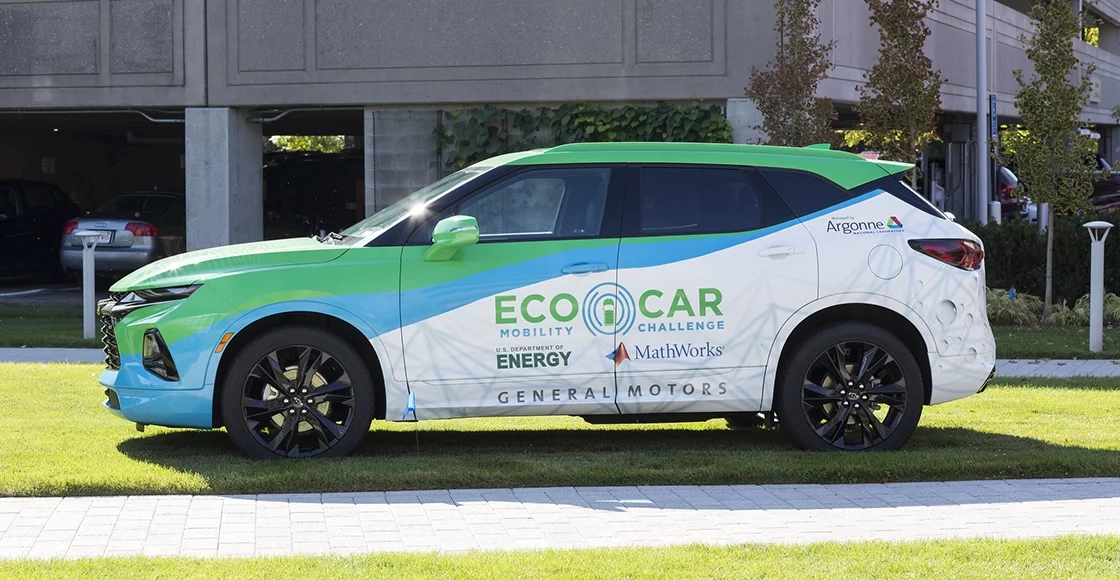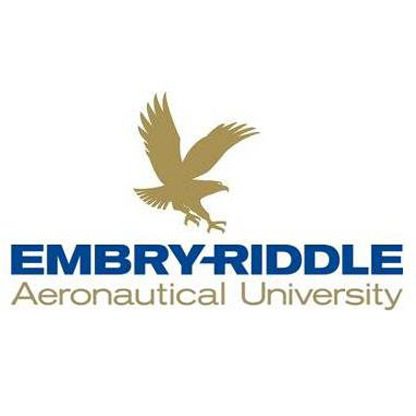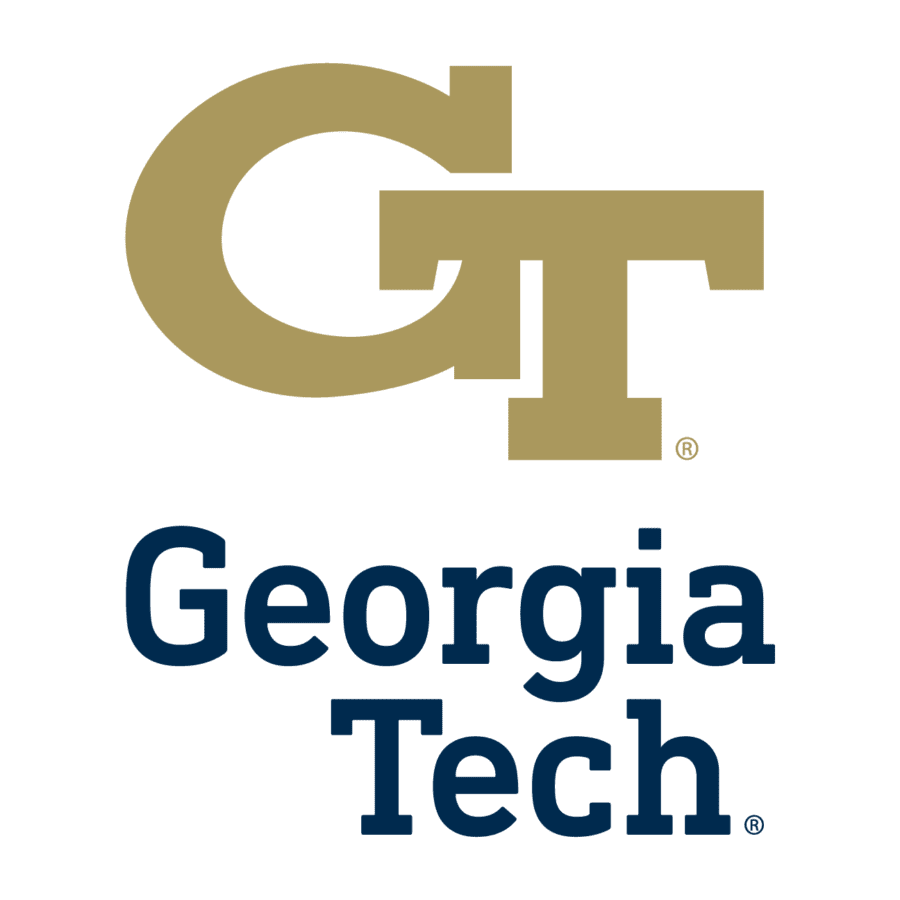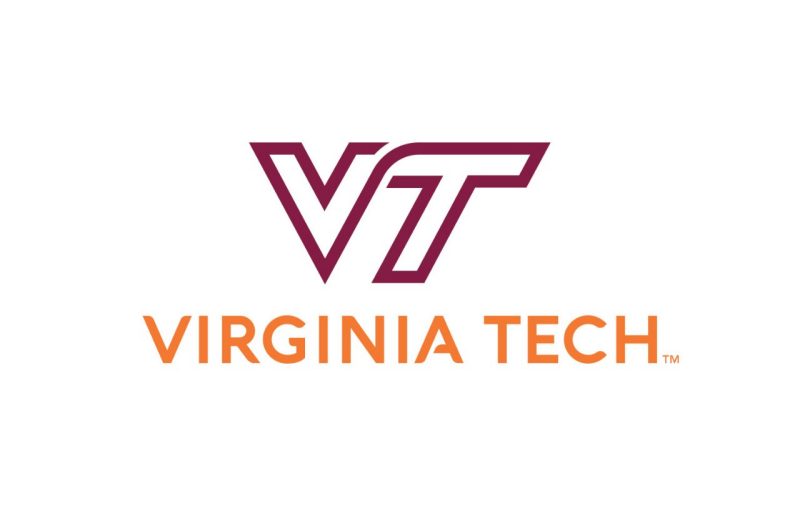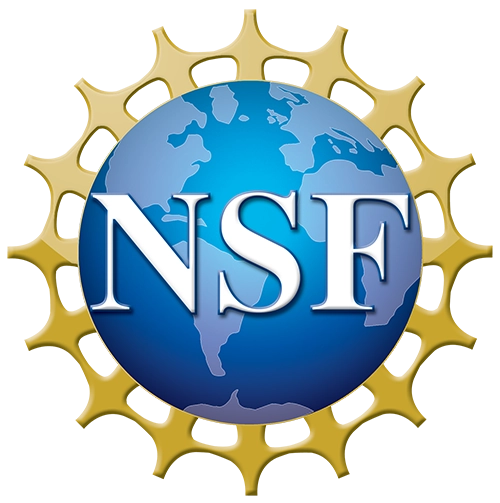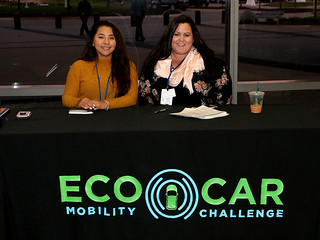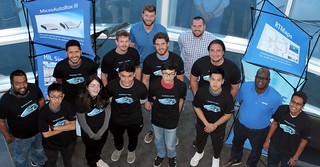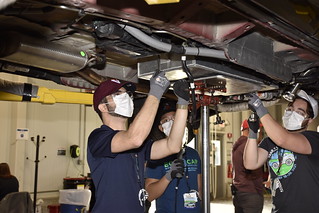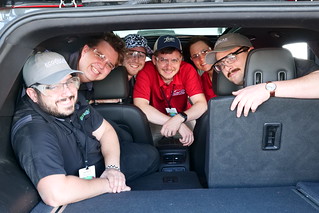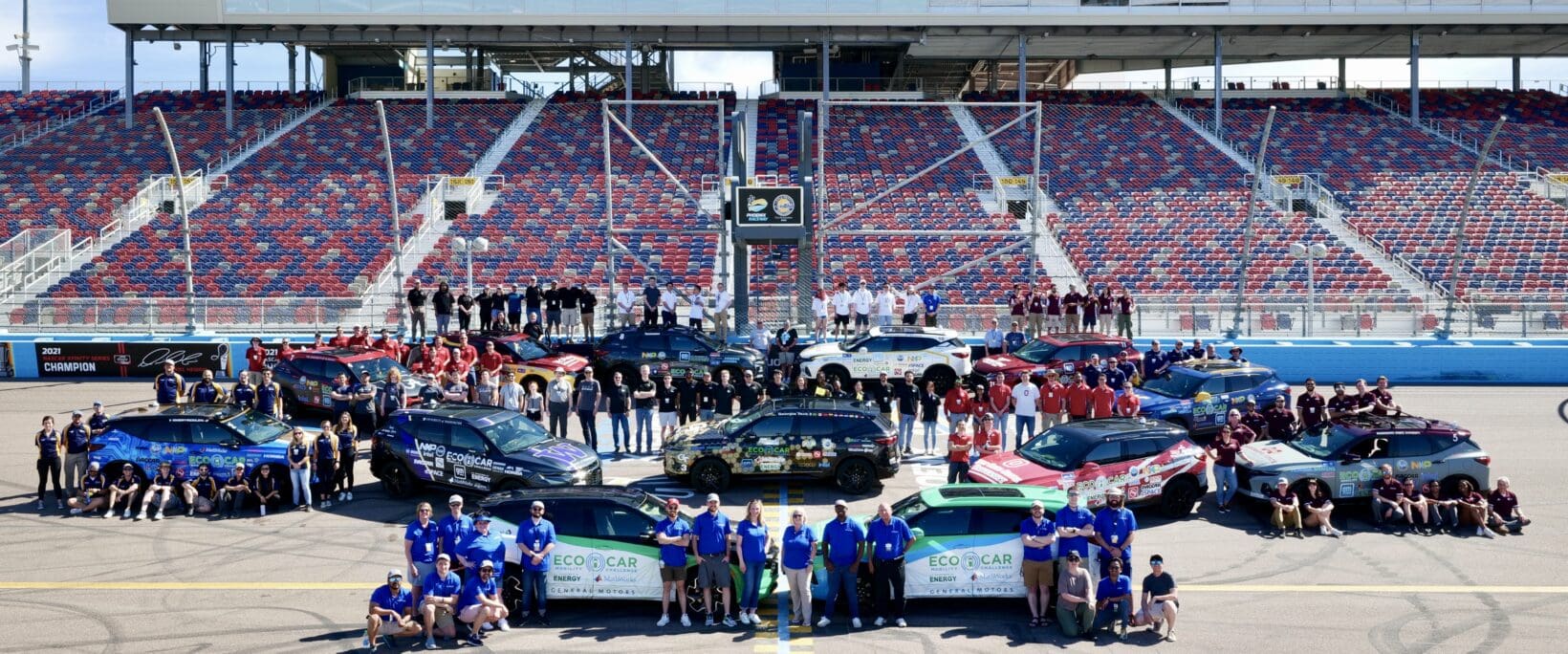
EcoCAR Mobility Challenge
Background
The EcoCAR Mobility Challenge (EcoCAR) was the 12th U.S. Department of Energy (DOE) Advanced Vehicle Technology Competition (AVTC) series. The four-year competition challenged 11 university teams to apply advanced propulsion systems, as well as connected and automated vehicle technology to improve the energy efficiency, safety and consumer appeal of the 2019 Chevrolet Blazer. This series was headline sponsored by DOE, General Motors (GM) and MathWorks, and managed by Argonne National Laboratory.
EcoCAR aimed to develop a highly skilled, domestic workforce by providing hands-on experience designing and building next-generation mobility solutions to meet our nation’s future energy and mobility challenges. Participating teams applied advanced propulsion systems, electrification, SAE Level 2 automation, and vehicle connectivity to improve the energy efficiency of a 2019 Chevrolet Blazer – while balancing factors such as emissions, safety, utility, and consumer acceptability. SAE Level 2 automation refers to a vehicle has combined automated functions, like acceleration and steering, but the driver must remain engaged with the driving task and monitor the environment at all times.
This competition began in fall of 2018 and concluded in spring 2022.
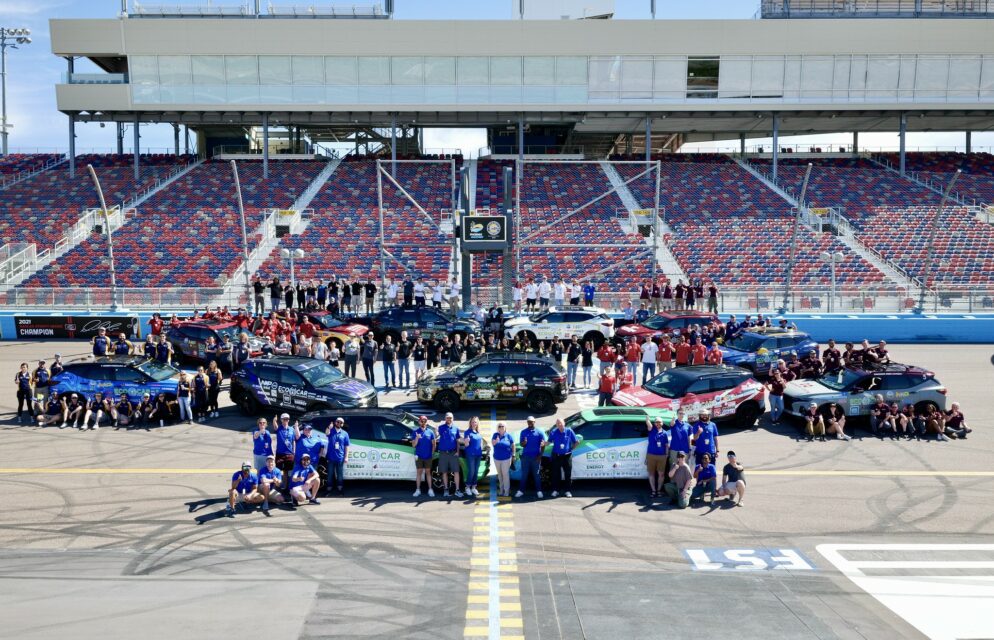
EcoCAR Mobility Challenge
Look back on memories from the EcoCAR Mobility Challenge
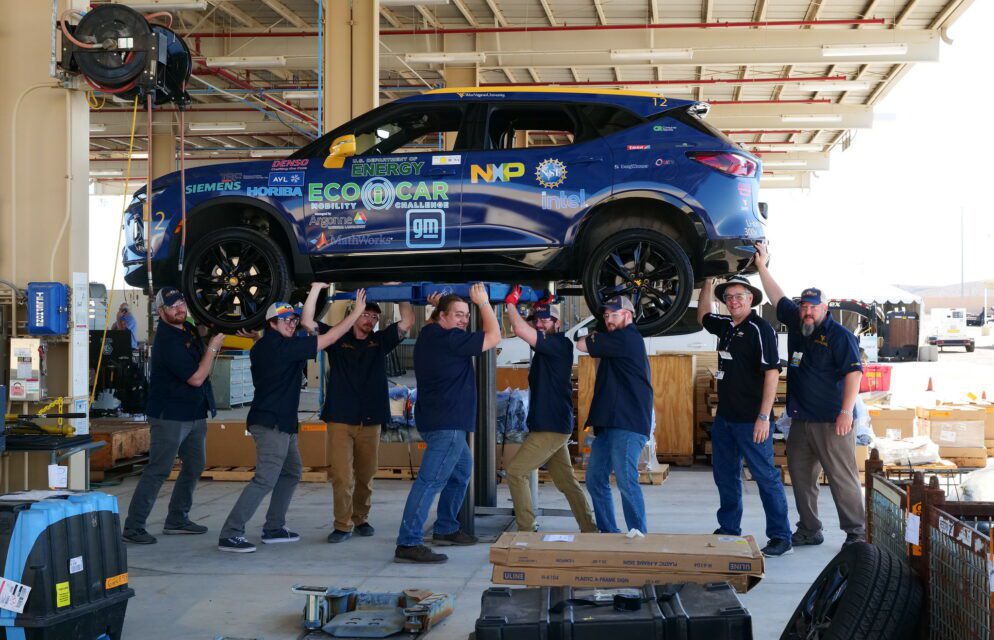
EcoCAR Mobility Challenge
Look back on memories from the EcoCAR Mobility Challenge
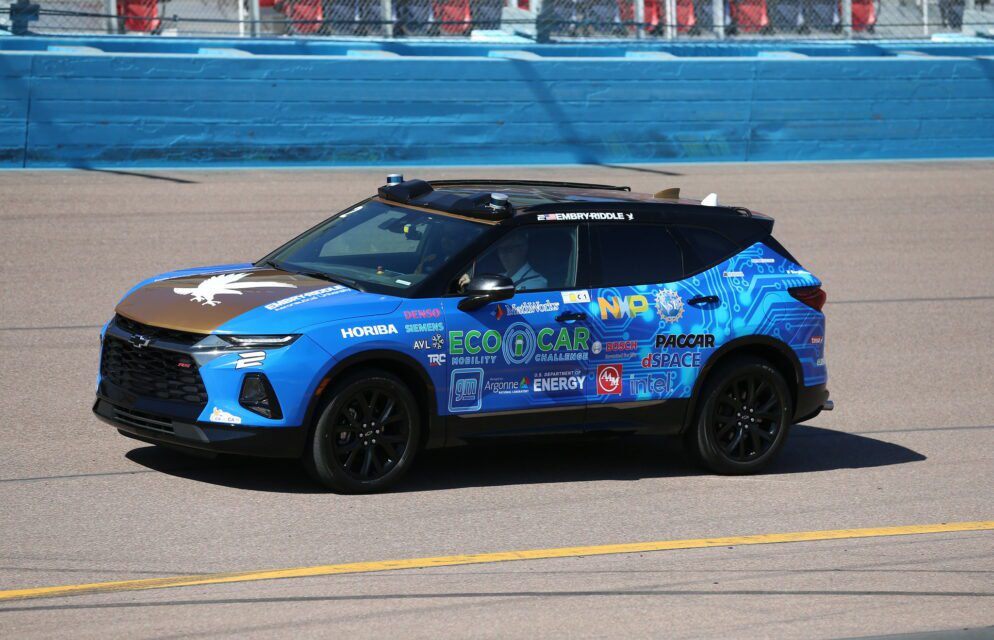
EcoCAR Mobility Challenge
Look back on memories from the EcoCAR Mobility Challenge
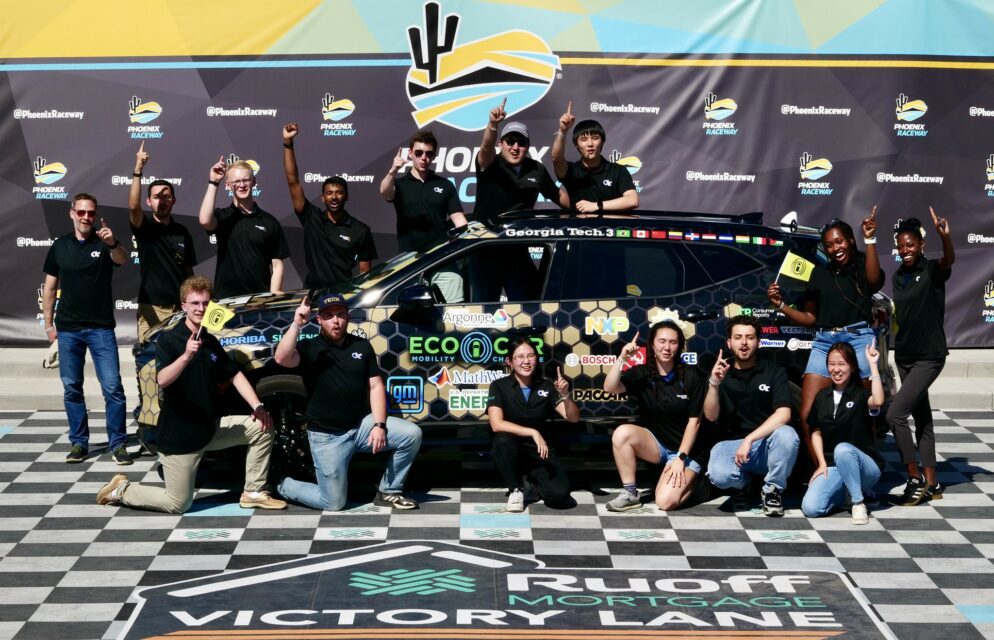
EcoCAR Mobility Challenge
Look back on memories from the EcoCAR Mobility Challenge
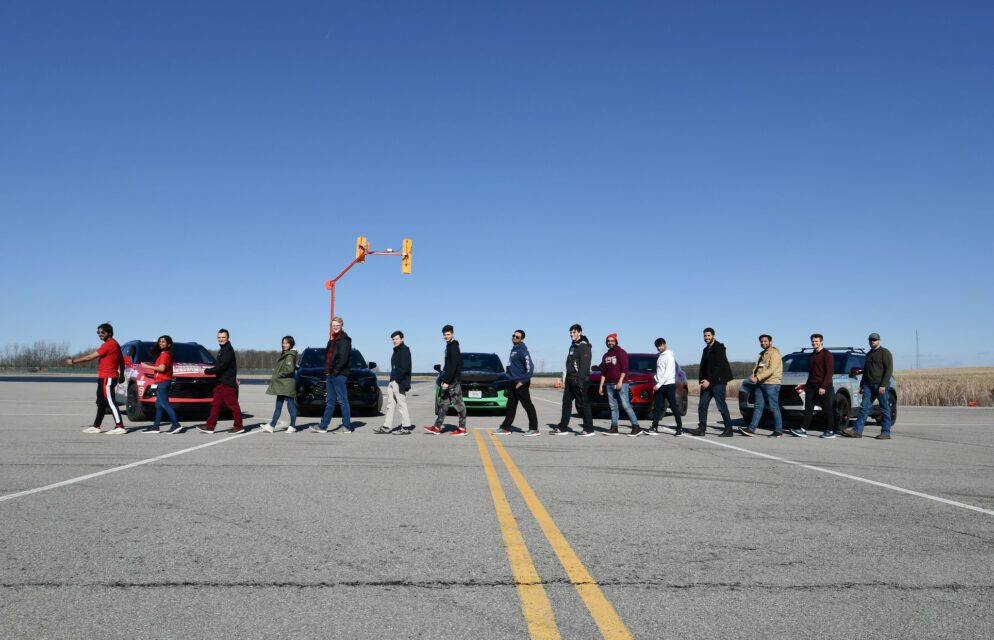
EcoCAR Mobility Challenge
Look back on memories from the EcoCAR Mobility Challenge
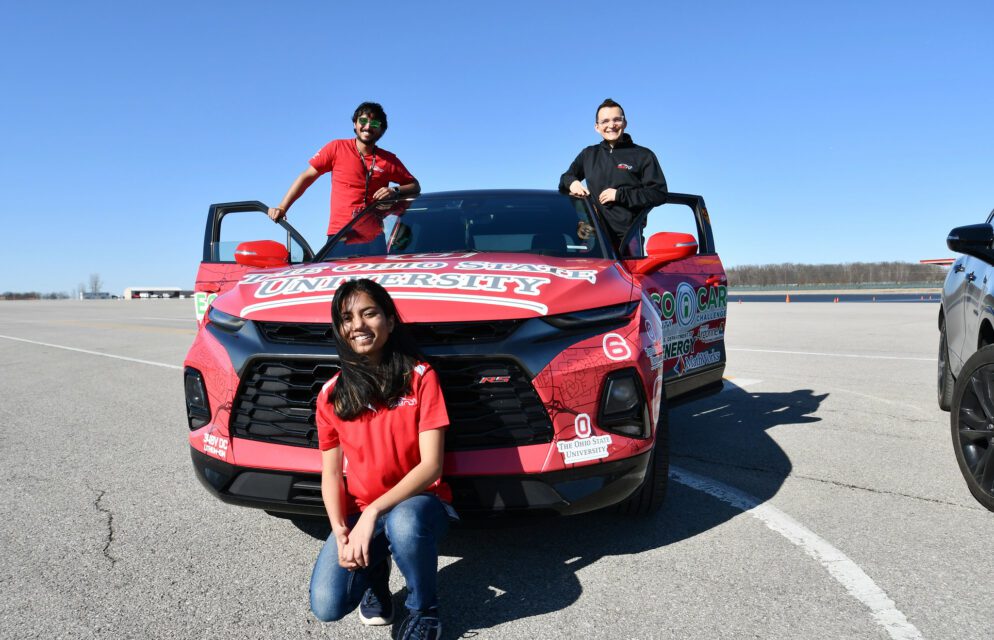
EcoCAR Mobility Challenge
Look back on memories from the EcoCAR Mobility Challenge
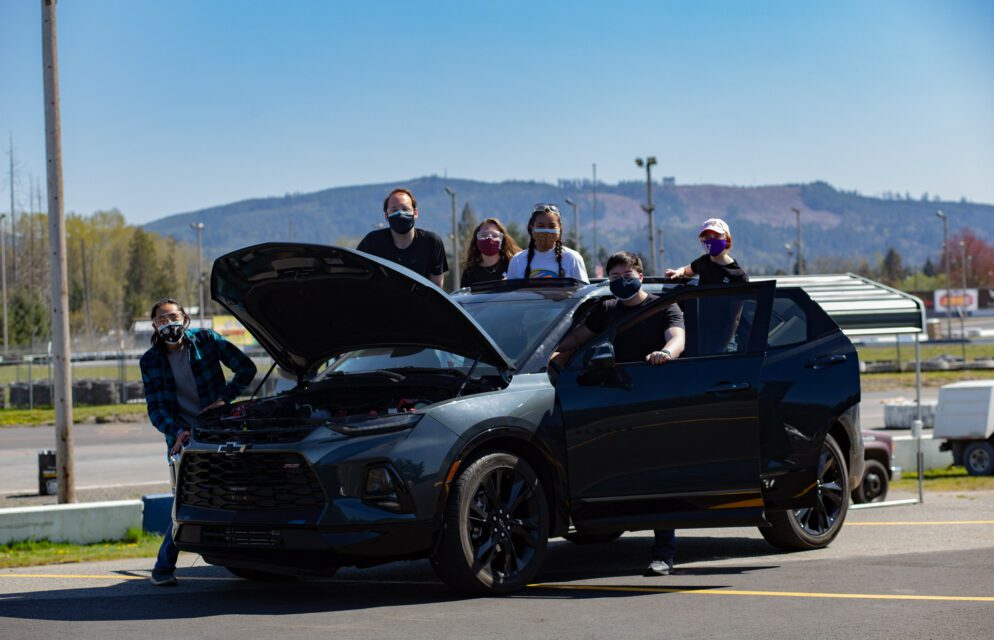
EcoCAR Mobility Challenge
Look back on memories from the EcoCAR Mobility Challenge
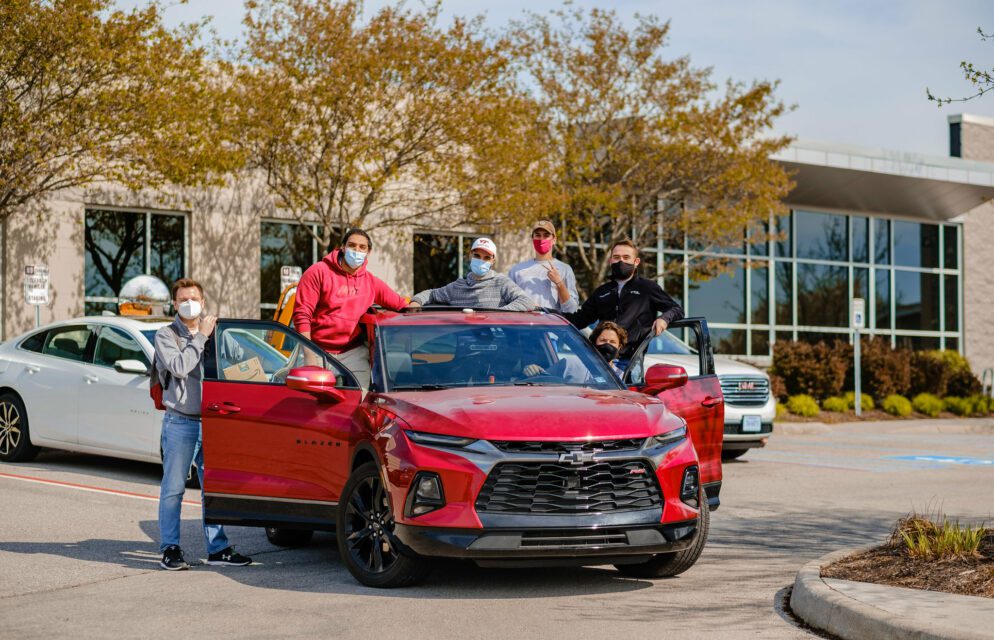
EcoCAR Mobility Challenge
Look back on memories from the EcoCAR Mobility Challenge
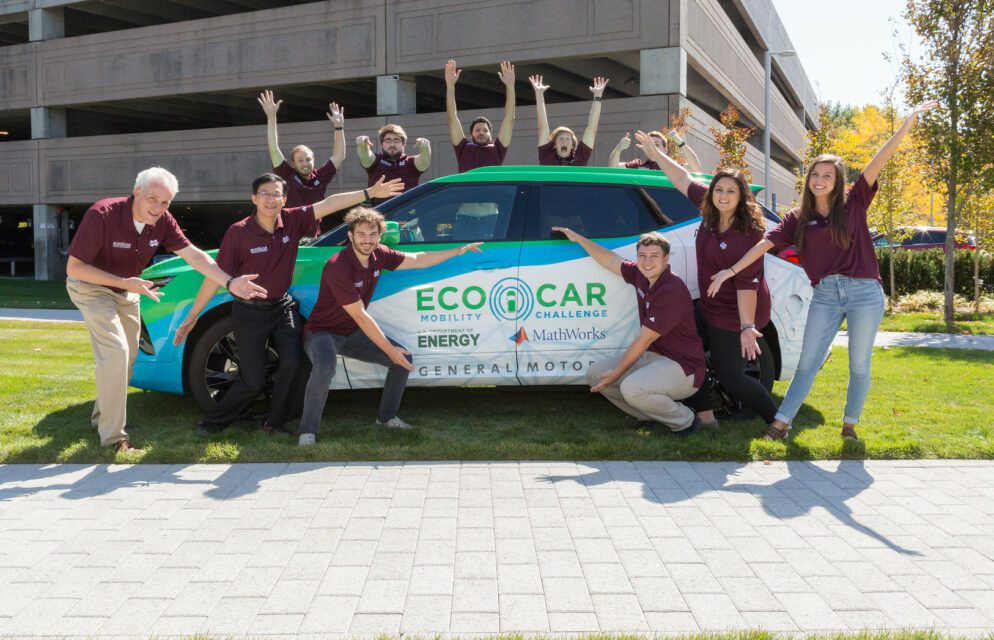
EcoCAR Mobility Challenge
Look back on memories from the EcoCAR Mobility Challenge
EcoCAR Mobility Challenge
Innovations & Highlights
Over the course of the EcoCAR Mobility Challenge, teams faced and overcame profound hurdles during the COVID 19 Pandemic. All teams were able to produce running vehicles that passed Vehicle Technical Inspections. In addition, teams demonstrated several Connected and Automated Vehicle (CAV) technologies, participated in an Over the Road Event from Yuma AZ to Phoenix AZ, demonstrated a team-developed functioning adaptive cruise control (ACC) system with full speed range as well as the ability to autonomously navigate a signalized intersection using vehicle-to-infrastructure technology. All of these achievements are a tremendous testament to the talent, grit, and resourcefulness of our EcoCAR teams.
2018
The 12th AVTC, the EcoCAR Mobility Challenge, begins
2019
EcoCAR Mobility Challenge is the first AVTC where teams can implement powertrain control based on perception system inputs
2020
Human Machine Interface / User Experience added as a focus area of EcoCAR
2021
Teams demonstrate Adaptive Cruise Control on-vehicle
2022
- More than 1,000 students from 11 North American universities participate each year, gaining real-world experience solving complex engineering challenges and building teamwork and leadership skills that they will take with them into their future careers.
- Going the extra mile! The 11 EcoCAR schools have logged >10,000 test miles on their vehicles in this year alone
- By the numbers: A total of 2646 students have participated in the EcoCAR Mobility Challenge. EcoCAR students from more than 38 college majors have participated in the latest EcoCAR Mobility challenge. More than 200 companies have hired an EcoCAR student (either full time or for an internship).
- According to the 2022 EcoCAR Salary Survey, EcoCAR graduates earn more than $4,000-$6,000 more than their non-EcoCAR peers in their first job.
- EcoCAR teams have modified their conventional 2019 Chevrolet Blazers to electrify the propulsion system through the addition of a HV battery pack and one or more electric motors. Teams were successful in developing their perception system and autonomous driving features as well as vehicle-to-infrastructure connectivity features. This allows the vehicle to implement adaptive cruise control and autonomous navigate a V2X connected intersection with a traffic light
- EcoCAR teams have integrated Dedicated Short Range Communication (DSRC) based Vehicle to Everything (V2X ) radios which enables the vehicles to interact with other vehicles and Road Side Units (RSU). The vehicles use Signal Phase and Timing (SPaT) and MAP information from the RSUs to navigate signalized intersections by autonomously coming to a stop at the red light and resuming on green without any driver interference.
- EcoCAR Sponsors helped students transform their Chevrolet Blazers. The following sponsored components can be found in the newly integrated vehicles:
- GM engine-transmission pairs
- GM HEV4 Energy Storage System (from the Malibu HEV)
- Denso Integrated Starter Generator motor
- Magna ERAD electric drive system
- AAM electric motor
- EcoCAR Mobility Challenge Concludes
Universities Involved
Winners & Awards
Take a look back on the successes of teams throughout the EcoCAR Mobility Challenge
Year One
OVERALL AWARDS
1st Place Overall
- Ohio State University
2nd Place Overall
- Virginia Tech
3rd Place Overall
- University of Alabama
4th Place Overall
- Georgia Tech
TECHNICAL PRESENTATION AWARDS
1st place: Target Market Presentation
- Ohio State University
2nd place: Target Market Presentation
- Georgia Tech
3rd place: Target Market Presentation
- University of Waterloo
1st place: Propulsion System Integration Presentation
- University of Alabama
2nd place: Propulsion System Integration Presentation
- Virginia Tech
3rd place: Propulsion System Integration Presentation
- Ohio State University
1st place: Controls and Systems Modeling & Simulation Presentation
- Ohio State University
2nd place: Controls and Systems Modeling & Simulation Presentation
- University of Waterloo
3rd place: Controls and Systems Modeling & Simulation Presentation
- McMaster University
1st place: Connected and Automated Vehicle Systems Presentation
- West Virginia University
2nd place:Connected and Automated Vehicle Systems Presentation
- Ohio State University
3rd place:Connected and Automated Vehicle Systems Presentation
- Embry-Riddle
1st place: Project Initialization Approval Presentation
- University of Waterloo
2nd place:Project Initialization Approval Presentation
- University of Alabama
3rd place: Project Initialization Approval Presentation
- McMaster University
PROJECT MANAGEMENT AWARDS
- Project Management
- 1st Place: University of Alabama
- 2nd Place: Embry-Riddle
- 3rd Place: West Virginia University
Best Target Market and VTS Selection Report
- Embry-Riddle
1st Place: Project Strategy and Risk Review Presentation
- University of Alabama
2nd Place: Project Strategy and Risk Review Presentation
- Embry-Riddle
3rd Place: Project Strategy and Risk Review Presentation
- University of Tennessee
Spirit of Project Management
- Bade Akinsanya, UWAFT
PRE-COMPETITION TECHNICAL DELIVERABLE AWARDS
- Best Historical Architecture Research- University of Alabama
- Best Final Technical Report-Ohio State University
- Best Technical Report – Runner Up – University of Washington
- 1st: Place Architecture Selection Report- Georgia Tech & Virginia Tech
- 3rd: Place Architecture Selection Report- Ohio State University
- Best Connected and Automated Vehicle Systems Deliverables – Embry- Riddle
- Best Connected and Automated Vehicle Systems Deliverables- Runner Up Ohio State University
- 1st Place: NSF Excellence in Connected and Automated Vehicles – Embry-Riddle
- 2nd Place: NSF Excellence in Connected and Automated Vehicles – Ohio State University
- 3rd Place: NSF Excellence in Connected and Automated Vehicles- West Virginia University
ORGANIZER AWARDS
Dr. Don Streit Sportsmanship Award
- University of Waterloo
Ron Stence Spirit of the Challenge Award
- Mississippi State University
Excellence in Leadership Award
- Priyash Misra, WVU
Excellence in Leadership Award: Runner Up
- Gabe DiDomenico, CSU
Team to Watch Award
- University of Waterloo
SPONSORED AWARDS
NSF Outstanding Faculty Advisor Award
- Dr. Hwan-Sik Yoon, the University of Alabama
Women in STEM Award
- Ashley Phan from the University of Alabama and Nikki Machado from Colorado State University
Women in STEM Runner Up
- Jerica Rattana from University of Waterloo
- 1st Place: Ohio State University
- 2nd Place: McMaster University
Year Two
PROJECT MANAGEMENT AWARDS
Best Execution Plan- Runner Up: West Virginia University
Best Execution Plan: Ohio State University
Best Winter Workshop Project Status Presentation – Runner Up: University of Alabama
Best Winter Workshop Project Status Presentation: Mississippi State University
Best Impact Report – Runner Up: University of Alabama
Best Impact Report: Ohio State University
TECHNICAL AWARDS
Best Final Technical Report – Runner Up: Embry-Riddle Aeronautical University
Best Final Technical Report: Ohio State University
3rd place – Subsystem Design Report: University of Washington
2nd place – Subsystem Design Report: Georgia Tech
1st place – Subsystem Design Report: Ohio State University
Best Human-Machine Interface & User Experience Video – Runner Up: Mississippi State University
Best Human-Machine Interface & User Experience Video: Ohio State University
COMMUNICATIONS AWARDS
Best Social Media Report: West Virginia University
Spirit of Communications: Haleigh Fields, West Virginia University
ORGANIZER AWARDS
Excellence in Leadership Award: Runner Up: Megan Wood, McMaster University
Excellence in Leadership Award: Easton Davis, University of Alabama
SPONSORED AWARDS
Women in STEM Runner Up: Grace Liang, University of Waterloo
Women in STEM Award: Kristina Kuwabara, Ohio State University
MathWorks Model Based Design Award – Third Place: Mississippi State University
MathWorks Model Based Design Award – Second Place: Virginia Tech
MathWorks Model Based Design Award – First Place: University of Waterloo
Year Three
OVERALL AWARDS
- 1st Place Overall – University of Alabama
- 2nd Place Overall – Ohio State University
- 3rd Place Overall – West Virginia University
- 4th Place Overall – Mississippi State University
TECHNICAL AWARDS
- Best Energy Consumption Testing – West Virginia University
- Best Drive Quality Testing – Ohio State University
- Best CAV Capability Evaluation – Mississippi State University
- Best Propulsion Systems Integration Presentation – University of Waterloo
- Best Propulsion Controls & Modeling Presentation – University of Alabama
- Best Connected and Automated Vehicle Systems Presentation – Ohio State University
- Best Human-Machine Interface and User Experience Presentation – Virgina Tech
- Best Vehicle Integration and Performance Review Video – Georgia Tech
Communications Awards
- Communications Overall
- 1st Place: West Virginia University
- 2nd Place: University of Tennessee, Knoxville & University of Washington
- Best Communications Presentation – West Virginia University
- Outstanding Team and Sponsor Collaboration: West Virginia University & Unviersity of Alabama
- Outstanding Team and Sponsor Collaboration: Runner-up: University of Washington
- Spirit of Communications – Arden Jacoby, McMaster University
PROJECT MANAGEMENT AWARDS
- Project Management Overall
- 1st Place: University of Alabama
- 2nd Place: Mississippi State University
- 3rd Place: Virginia Tech
- Best Execution Plan – University of Washington
- Best Mid- Year Project Status Presentation – Virginia Tech
- Best Impact Report – University of Alabama
- Best Year-End Project Status Presentation – University of Alabama
PRE-COMPETITION TECHNICAL DELIVERABLE AWARDS
- Best Final Technical Report: Ohio State University
- Best Human-Machine Interface and User Experience Work Plan: Georgia Tech
- Best Year 3 Vehicle Technical Inspections: University of Alabama
- Best Year 3 Vehicle Technical Inspections: Runner-Up: Ohio State University
- Best Spring Vehicle Evaluation: Mississippi State University
- Best Spring Vehicle Evaluation: Runner-Up: Ohio State University
ORGANIZER AWARDS
- EcoCAR Collaboration Award – Georgia Tech & West Virginia University
- Ron Stence Spirit of the Challenge Award – University of Waterloo
- Excellence in Leadership Award – Brandon Stevens, University of Alabama
- Excellence in Leadership Award: Runner Up – Amine Taoudi, Mississippi State University
SPONSORED AWARDS
- NSF Outstanding Faculty Advisor Award – Patrick Currier, Embry-Riddle Aeronautical University
- General Motors Women in STEM Award – Madeline Gilmer, University of Alabama & Andrea Howison, Embry-Riddle Aeronautical University
- General Motors Women in STEM Rookie Award – Sophy Li – University of Waterloo
- 1st Place- MathWorks Model-Based Design Award – Mississippi State University
- 2nd Place – MathWorks Model-Based Design Award – University of Alabama
- 3rd Place- MathWorks Model-Based Design Award – McMaster University
- 1st Place- dSPACE Leadership in Validation Award – University of Alabama
- 2nd Place- dSPACE Leadership in Validation Award – Ohio State University
Year Four
OVERALL AWARDS
- 1st Place Overall: Georgia Tech
- 2nd Place Overall: Ohio State University
- 3rd Place Overall: University of Alabama
- 4th Place Overall: Virginia Tech
COMMUNICATIONS AWARDS
- Best AVTC Impact Video: Georgia Tech
- Outstanding Team & Sponsor Collaboration- Runner Up: University of Tennessee, Knoxville & Virginia Tech
- Outstanding Team & Sponsor Collaboration: Ohio State University
- 1st Place: Influencer Engagement Report: Georgia Tech
- 3rd Place: Communications Presentation: Ohio State University
- 2nd Place: Communications Presentation: West Virginia University
- 1st Place: Communications Presentation: Georgia Tech
PROJECT MANAGEMENT AWARDS
- 1st Place: Execution Plan: Georgia Tech
- 1st Place: Mid-Year Project Status Presentation: Ohio State University
- 1st Place: Impact Report: University of Alabama
- 1st Place: Final Project Status Presentation: Mississippi State University
- 3rd Place: Project Management Program: University of Tennessee, Knoxville
- 2nd Place: Project Management Program: Georgia Tech
- 1st Place: Project Management Program: Mississippi State University
TECHNICAL PRE-COMPETITION & PRESENTATION AWARDS
- 1st Place: Final Technical Report: Ohio State University
- 1st Place: HMI/UX Prototype Integration & Evaluation Plan: Georgia Tech
- 1st Place: Propulsion Systems Integration Presentation: Ohio State University
- 1st Place: Propulsion Controls & Modeling Presentation: Georgia Tech
- 1st Place: Connected and Automated Vehicle Systems Presentation: Georgia Tech
- 1st Place: Human-Machine Interface and User Experience Presentation: Ohio State University
COMPETITION VEHICLE EVENT AWARDS
- 1st Place: ACC Enabled Energy Consumption: Georgia Tech
- 1st Place: Normal Driving Mode Energy Consumption: Georgia Tech
- 1st Place: Drive Quality: West Virginia University
- 1st Place: Connected Mobility Challenge: Georgia Tech
- 1st Place: CAV Perception System & ACC Drive Quality Evaluation: West Virginia University
- 1st Place: HMI/UX Evaluation: Mississippi State University
- 1st Place: Consumer Appeal Event: Ohio State University
- Best Connected & Automated Vehicle Systems – Runner Up: Virginia Tech
- Best Connected & Automated Vehicle Systems: Georgia Tech
ORGANIZER AWARDS
- EcoCAR Collaboration Award: University of Washington
- Ron Stence Spirit of the Challenge Award: McMaster University
- Excellence in Leadership Award: Vance Hudson, Mississippi State University & Nishan Nekoo Georgia Tech
SPONSORED AWARDS
- NSF Outstanding Faculty Advisor Award: Drew Nix, West Virginia University
- General Motors Women in STEM Rookie Award: Bahar Koholdi-Sabeti, University of Waterloo
- General Motors Women in STEM Award: Bethany Welty, University of Alabama
- 3rd Place: MathWorks Model-Based Design Award: Virginia Tech
- 2nd Place: MathWorks Model-Based Design Award: University of Alabama
- 1st Place: MathWorks Model-Based Design Award: Mississippi State University
- 2nd Place: Bosch ADAS Development Environment Award: University of Tennessee, Knoxville
- 1st Place: Bosch ADAS Development Environment Award: Georgia Tech
- 2nd Place: AAM Workmanship Award: Georgia Tech
- 1st Place: AAM Workmanship Award: Ohio State University
- 2nd Place: dSPACE Leadership in Validation Award: University of Alabama
- 1st Place: dSPACE Leadership in Validation Award: Ohio State University
EcoCAR Mobility Challenge Sponsors
Headline
Visionary
Leadership
Sustaining
Contributor
EcoCAR Mobility Challenge Media
Take a look back at the EcoCAR Mobility Challenge Media!
Select a tab above to view content
- Georgia Tech takes top honors in The EcoCAR Mobility Challenge May 23, 2022
- University of Alabama takes top honors in The EcoCAR Mobility Challenge June 9, 2021
- The Ohio State takes honors in The EcoCAR Mobility Challenge May 22, 2019
- The EcoCAR Mobility Challenge September 6, 2019
- The Ohio State takes honors in The EcoCAR Mobility Challenge Press Release May 23, 2019
- The Ohio State takes home the top spot in EcoCAR 3 competition May 23, 2018
- The U.S. Department of Energy, General Motors and MathWorks launch EcoCAR Mobility Challenge October 24, 2018
ProQuest No. 13420121 |
ProQuest No. 10844828 |
ProQuest No. 10846269 |
ProQuest No. 10844826 |
20AE-0258/2020-01-0736 |
20AE-0266/2020-01-0729 |
https://www.mdpi.com/2079-9292/9/2/228 |
https://www.scirp.org/journal/paperinformation.aspx?paperid=97656 |
https://www.mdpi.com/2079-9292/9/2/228 |
https://www.mdpi.com/2032-6653/12/2/54 |
https://saemobilus.sae.org/content/14-10-01-0001/ ISSN: 2691-3747 e-ISSN: 2691-3755" |
ProQuest No. 13420121 |
ProQuest No. 10844828 |
ProQuest No. 10846269 |
ProQuest No. 10844826 |
https://researchrepository.wvu.edu/etd/7476/ |
https://ieeexplore.ieee.org/document/8891250/ |
https://www.scirp.org/journal/paperinformation.aspx?paperid=97656 |
https://researchrepository.wvu.edu/etd/7847/ |
https://asmedigitalcollection.asme.org/dynamicsystems/article-abstract/143/9/094504/1107110/Comparison-of-Model-Predictive-Control-and?redirectedFrom=fulltext |
https://asmedigitalcollection.asme.org/dynamicsystems/article-abstract/143/9/094504/1107110/Comparison-of-Model-Predictive-Control-and?redirectedFrom=fulltext |
https://researchrepository.wvu.edu/etd/8204/ |
https://researchrepository.wvu.edu/etd/7185/ |
https://researchrepository.wvu.edu/etd/7169/ |
https://researchrepository.wvu.edu/etd/7179/ |
https://researchrepository.wvu.edu/etd/7476/ |
https://www.scirp.org/journal/paperinformation.aspx?paperid=97656 |
https://researchrepository.wvu.edu/etd/7847/ |
https://www.scirp.org/journal/paperinformation.aspx?paperid=111142 |
https://researchrepository.wvu.edu/etd/10154/ |
https://researchrepository.wvu.edu/etd/10204/ |
https://researchrepository.wvu.edu/etd/10210/ |
https://researchrepository.wvu.edu/etd/10241/ |
